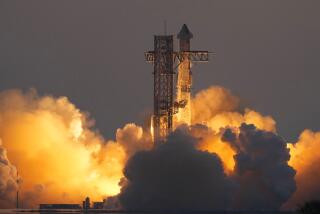Shuttle Countdown Begins After Satellite Is Repaired
KENNEDY SPACE CENTER, Fla. — NASA began the second countdown for Atlantis on Friday and aimed for a Sunday liftoff after resolving a power problem in the rocket of a military spy satellite aboard the shuttle.
The Defense Department cleared the new satellite rocket steering system for flight and reported that the rest of the military cargo was in proper working order.
“All systems remain nominal and ready to go,” said Air Force Maj. Mike Booen, a program director.
Atlantis is scheduled to blast off with the satellite and six astronauts at 3:31 p.m. PST Sunday, five days later than planned. The flight was delayed Tuesday after the guidance unit in the satellite booster malfunctioned.
Technicians replaced the 90-pound unit with a spare that passed extensive testing. The trouble with the original unit was traced tentatively to the power supply for a gyroscope and accelerometer, said Air Force Lt. Col. Ernie Jaskolski, chief engineer of the satellite booster program.
The two instruments failed in the final phase of testing, forcing an end to the first countdown nine hours before scheduled liftoff. The four other sets of instruments in the navigation unit worked properly.
Shuttle test director Al Sofge said the second countdown was going well, with only a few “nickel and dime problems that you have when you have a complicated rocket ship.”
Forecasters called for a 60% chance of good weather at launch time. Rain and high winds were the main concerns.
Atlantis’ astronauts returned to Kennedy Space Center on Friday after a quick trip to Johnson Space Center in Houston for more shuttle simulator practice.
The crew’s main job during the 10-day flight is delivery of the $300-million Defense Support Program satellite. An attached rocket is to boost the satellite from the shuttle’s 224-mile-high orbit to a perch 22,300 miles above Earth.
The Pentagon has been sending up similar satellites for the last two decades. This is the first time that such a satellite has been transported by a National Aeronautics and Space Administration shuttle; unmanned rockets carried up the rest.
The military got a bargain by reserving the shuttle flight in the early 1980s, when NASA was counting on more than a dozen shuttle trips a year. Officials said the Pentagon paid NASA $60 million for the mission. Current estimates put the cost of each shuttle mission at more than $330 million.
More to Read
Sign up for Essential California
The most important California stories and recommendations in your inbox every morning.
You may occasionally receive promotional content from the Los Angeles Times.










